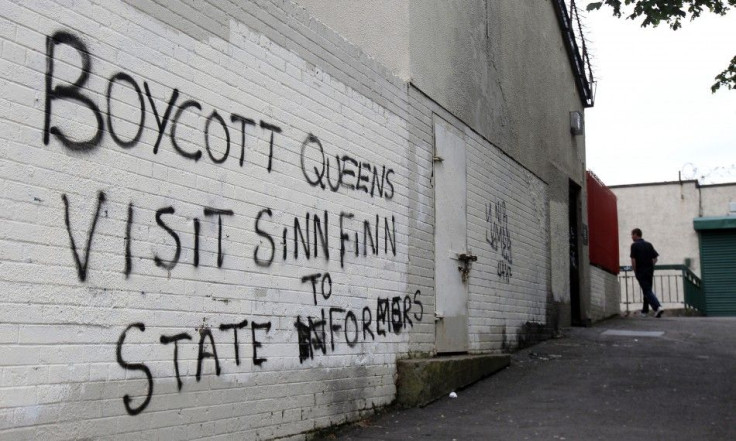Queen Elizabeth To Meet With Former IRA Leader In Historic Encounter

They blew up her cousin more than three decades ago, but now she will meet with one of the men associated with those killers.
During her sojourn in Northern Ireland as part of her Diamond Jubilee celebration, Queen Elizabeth II’s itinerary will include an extraordinary meeting with Martin McGuinness, the deputy First Minister of Northern Ireland, in Belfast on Wednesday.
McGuinness is also a former commander of the Irish Republican Army (IRA), making this the first such encounter between the reigning British monarch and a senior official of the militant group that once waged a long war against British troops in Ulster.
Such a meeting would have been unthinkable years ago, commented Owen Paterson, the Northern Ireland Secretary who is accompanying the Queen on her two-day visit.
Indeed, the Queen’s husband’s uncle Lord Mountbatten was murdered by the IRA in 1979 on a fishing boat in what was the perhaps the highest-profile murder by the Irish militant group (IRA members would try and fail to blow up British Prime Minister Margaret Thatcher in Brighton, England a few years later in 1984).
McGuinness himself has claimed that he left the IRA in 1974 (five years before Mountbatten’s assassination).
However, at one point in 1972, he was second-in-command of the IRA in Derry, during the time of “Bloody Sunday” when British troops killed 14 civil rights protesters in that city.
McGuinness’ membership in the IRA and what crimes (if any) he committed during his tenure in the organization have long been debated. There were reports that in retaliation for “Bloody Sunday” he and his compatriots planned to attack the city center. By the following year, he was convicted in Ireland of possessing 250 lbs of explosives and 5000 rounds of ammunition in a car and sentenced to six months in jail.
British media also claimed that McGuinness had prior knowledge of the 1987 IRA bombing in Enniskillen on Remembrance Day, which killed 11 civilians (The Queen commemorated those victims during her stay in Enniskillen on Tuesday). McGuinness denied he had such foreknowledge on the atrocity.
However, now as a leading political of the establishment, McGuiness is dealing with a whole new set of problems.
Among other things, there was speculation among the British and Irish media that his meeting with the Queen would be conducted in private; however he has insisted he has no objection to being seen and photographed in public with the monarch.
He even declared that his meeting with Elizabeth will “propel the peace process forward to a new unprecedented level.”
In comments to the Irish media prior to his meeting with the Queen, McGuiness admitted that both sides of the long conflicts have suffered losses.
“I represent people who have been terribly hurt by British state violence over many years,” he said.
“I also recognize I am going to meet someone who has also been hurt as a result of the conflict, and someone who is very conscious that in many homes in Britain there are parents, wives, children, brothers and sisters of British soldiers who were sent here who lost their lives in the conflict.”
However, McGuinness said that he will probably not address the Queen with the “Your Majesty” honorific.
McGuiness also denied assertions that by meeting the Queen he would be acknowledging her as the head of state of Northern Ireland.
“I am not a royalist. I am not a monarchist, I am an Irish republican. The person I recognize as the head of state is President Higgins,” he said, referring to Michael Higgins, the president of the republic of Ireland.
Northern Ireland’s First Minister David Trimble, the former Ulster Unionist chief, said the historic meeting between the Queen and the former IRA represents a “natural progression” for Sinn Fein, the principal republican political party in Ulster and formerly associated with the Provisional IRA. (Sinn Fein boycotted the Queen’s visit to the Republic of Ireland last year).
“The timing's not a surprise; the republicans misjudged the popular reaction to the Queen in the Republic of Ireland during the State visit and I'm sure they wouldn't want to be seen by their electorate as misjudging their reaction to this visit coming up this week,” Lord Trimble said.
“I'm not surprised that it's happening, I'm a little bit surprised at the fuss that they are making about it as if it was a huge deal. I'm sure they have known for ages that this was inevitable, and there are still further steps.”
Gerry Adams, the president of Sinn Fein, hailed the upcoming meeting as a means of extending a hand to unionists, while concurrently declaring his opposition to the monarchy.
“This week's meeting is a clear expression of our desire to engage with our unionist neighbors and to demonstrate that we are prepared, once again, to go beyond the rhetoric as we seek to persuade them that our new Ireland will not be a cold house for unionists, or any other section of our people,” said Adams.
However, some republicans are condemning McGuinness for planning to meet with the Queen.
Laurence O’Neill, the founder of the Provisional IRA, denounced McGuinness as a “traitor” during a speech before 300 people in Crossmaglen. O’Neill also branded the Queen as “commander in chief” of the British Army which had killed hundreds of Irish republicans over the years.
“Shame on those who sold us out,” he bellowed.
While the IRA ended its 30-year campaign against British rule in 1998, smaller splinter groups remain, some of whom may pose a security threat to the Queen
© Copyright IBTimes 2025. All rights reserved.





















